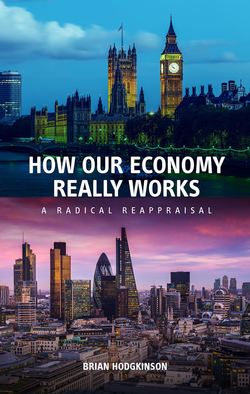Читать книгу How our economy really works - Brian Hodgkinson - Страница 8
На сайте Литреса книга снята с продажи.
Preface
ОглавлениеIN ONE SENSE this book has nothing to do with Brexit. It could have been written twenty years ago, or even much earlier. Above all it is a response to the fundamental questions that have confronted the UK economy for decades, and with which successive governments of the right and the left have failed to deal adequately. Some of these questions are obvious, such as, ‘Why does poverty still beset a large number of people, whilst others are grossly well-off?’; ‘Why are house prices continuously rising much faster than inflation, so that more and more people are left without a house of their own, or are borne down by the weight of a mortgage?’; ‘Why does UK productivity remain persistently low, despite constantly improving technology?’. Other questions are less obvious, or are ignored through a belief in their arising from the natural order of things, such as ‘Why do the majority of workers find themselves as employees in jobs that give them little real sense of fulfilment?’; ‘Why is there awful traffic congestion, despite heavy expenditure on transport infrastructure?’; ‘Why does the tax system fail to bring about greater equality, despite progressive rates of tax on incomes?’ All these questions, obvious or not, are perennial ones, not particularly related to membership of the European Union, although some extreme advocates of Brexit might claim that they are.
In another sense this book has a lot to do with Brexit, for the simple reason that all would agree that Brexit leaves the UK economy in a new, unprecedented position. This inevitably arouses both hopes and fears of substantial change. Such hopes and fears may alike be irrational, but even so they raise the possibility of genuine reform. Yet it is my contention that Brexit alone does not change anything fundamental about the economy.
Why this is so emerges in the argument which follows. In short, it is that what requires fundamental reform is not any features of being or not being within the EU, but more deeply embedded ones, which have generally been established for a very long time. They are principally threefold: the taxation system, the land tenure system, and the banking system. All three are profoundly interconnected. All three require root and branch reform. The presence of concerns engendered by Brexit may provide an opportunity lacking in more equable times.
Perhaps one final concession may be made to the Brexiteers. Fundamental reform of all three systems might be easier to carry through outside the EU. Full national sovereignty gives, at least, an opportunity to make changes to the very structure of the economy. Ideally these reforms would spread beyond the UK, or perhaps there would have been a chance of the EU itself adopting them under the influence of the UK as a member. But that would require an even greater revision of endemic ideas than reform in the UK alone would necessitate.
